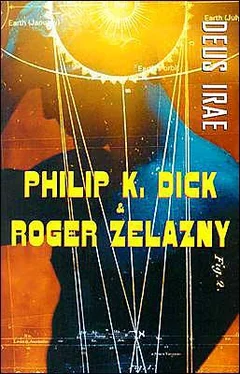“No.” The bird hopped from its perch and came swooping down to land on Tibor’s shoulder. “Consider this,” the bird said. “Who else can you depend on if you can’t—or don’t—depend on me? I have waited many years for you to appear; I knew a long time ago that you would be coming this way, and when I heard your hymns I found myself overcome by joy. That was why you heard me, then, caroling your happy songs. I especially like the Old One Hundred; in point of fact that’s my favorite. So don’t you think you can trust me?”
“Quite certainly a bird that sings hymns should be trusted,” Tibor decided aloud.
“And I am that bird.” The jay fluttered up into the air, with impatience visible in every trembling feather. What a beautiful large blue and white bird, Tibor thought to himself as he watched it ascend. I’m positive I can trust it, and there is no real alternative. Perhaps I will have to go many places, see many men who are not the Deus Irae, before I find the overwhelming, the authentic, one. Such is a Pilg.
“But I can’t follow you,” Tibor pointed out. “Because of my dry wheel bearing. I doubt if the mucus—”
“It works very well,” the bird said. “You’ll be able to follow me.” It hopped off and disappeared into a nearby tree. “Come on!”
Tibor started his cart into motion; he nudged the patient cow and off he and the cow went, rumbling north.
Blue sky and long-shafted warm sunlight spilled down on them as they progressed. Evidently, in the light of day many of the more unusual lifeforms preferred to remain hidden; Tibor found himself encountering no one, and somehow this distressed him more than the parade of sports and freaks and chardins which he found himself facing during the nocturnal hours. But, he thought, anyhow I can see the bird clearly. Which was essential. This higher-stage entity: it was his lodestar, now.
“Nobody lives along this way?” he asked as the cow paused for a moment of cropping the tall reddish weeds.
“They just wish to survive in deserved anonymity,” the bird said.
“Are they that dreadful?”
“Yes,” the bird said. It added, “To conventional eyes.”
“Worse than runners and lizards and bugs?”
“Even worse.” The bird did not seem to be afraid: it hopped and skipped about on the leaf-soaked ground, finding bits of nut here and there to gorge itself as well as possible. “There’s one,” the bird said, “that—”
“Don’t tell me,” Tibor said.
“Well, you asked.”
“I asked,” Tibor said, “but I didn’t want or expect an answer.” He flicked the cow and, once more, the big animal lurched forward to continue their journey. Pleased, the bird spun upward into the dark blue sky; itfluttered off, and the cow, as if understanding their relationship to the bird, followed.
“Is he evil-looking?” Tibor asked the bird.
“The God of Wrath?” The bird dropped like a stone, landing on one edge of Tiber’s cart. “He is—how shall I say it? Not ordinary-looking; yes, one could say that. Not ordinary-looking in any respect. A large man, but, as I said, a man with bad breath. A powerfully built man but stooped by neurotic cares. An elderly man, but—”
“And you’re not even sure it’s him.”
“Reasonably sure,” the bird said, unruffled.
Tibor said, “He lives in a human settlement?”
“Right!” the bird said, pleased. “With about sixty other men and women… none of whom know who he is.”
“How did he make himself known to you?” Tibor said. “How did you recognize him if they couldn’t? Is there a stigma of any sort?” He hoped there was; it would make the painting that much easier, once he had painted the stigma in.
“Just the stigma of death and despair,” the bird declared carelessly as it tripped about here and there. “It’s profound, as you will see when we get there.”
Tibor glanced up at the bird, who now hovered slightly ahead of him, and said, “And you have nothing more definite than that to go on?”
“I saw him two years ago,” the bird said. “For the first time. Since then I have often seen him. But my tongue was tied in a knot, up till no more than an hour ago; I could speak to no one, really. And then you sipped of the worm’s slime and learned to understand my words.”
“Interesting,” Tibor said, urging the cow on. “But you didn’t answer the question.”
“I tried,” the bird said. “Look, Mr. Tibor, you don’t have to follow me; no one’s making you go. I’m just doing this as a public service; I’m not getting anything out of it, except overstrained wing muscles.” It flapped at him angrily.
The wood through which they moved had begun to thin, now. Far ahead he saw mountains, or perhaps, only large hills. Their sides had turned from green to a pale straw color; here and there dark blackish-green clumps showed up, evidently trees. Between Tibor and the hills lay a long, fertile-looking valley. He saw roads, functioning to some extent, and, on one of the roads, a vehicle of sorts; it put-putted along, its sound rising noisily in the cool air of morning.
And a settlement, where three of the roads combined. Not a large settlement, but unusual by present standards; many.of the buildings appeared to be fairly large: stores or factories, perhaps. Commercial buildings, including what seemed to be a small airfield.
“There,” the bird informed him.
“New Brunswick, Idaho,” the bird said.
“That’s because we crossed the state line,” the bird added. “We were in Oregon but now we’re in Idaho. You dig?”
Tibor said, “Yes.” He flicked the cow and it resumed its great-hoofed march. Now the wheel bearings had begun to squeal and knock again; he heard them but he thought, I can make it to the town, and there I probably can locate a blacksmith who can insert a new bearing unit, possibly one for each wheel. Because if one is running dry, the others must be nearly dry, too. But how much money would it cost?
“Can you get the repair work on my cart at wholesale prices?” he asked the bird.
“That doesn’t exist anymore,” the bird said. “There are no factories, just self-contained enclaves such as you see here. I can find a competent repairman, however; there’s at least two in New Brunswick who specialize in repairing prewar equipment.”
“My cart is postwar,” Tibor said.
“They can fix that, too.”
“And the cost?”
“Maybe we can barter,” the bird said. “Too bad you didn’t pick up some of the valuables of the worm; you could have walked off with any and all of them.”
“Junk,” Tibor said. And then, amazed, he said, “You mean that such rubbish is considered valuable out here?” They must be far behind our level, he realized. And I’m still close to home. That close, and everything is different. How isolated we are. How little we know. How much has been lost!
“The bedsprings would have been worth bringing here,” the bird said. “The handymen in the town can use the steel to make tools of several sorts. Knives, picks—a variety of things.”
“And the transistor radio? When there’s nothing on the air?”
“The unit could be adapted to form an antifertility generator, to be operated during sexual intercourse.”
“God,” Tibor said, appalled. “You mean they’re curbing the birth rate? When the population of the world is down to a few million?”
“Because of the altereds being born,” the bird said. “Like yourself, if you don’t mind my saying so. They would, in New Brunswick, rather have no births than have ugly, deformed mutations spawned all around them.”
Tibor said, “Maybe they’ll drive me out, as soon as they see me.”
“Very possibly,” the bird agreed. It fluttered on, down the slope of the hill, toward the flat floor of the valley beneath.
Читать дальше








